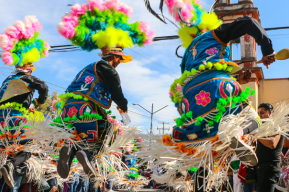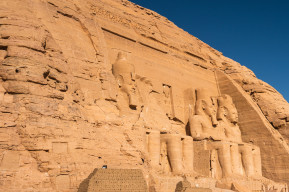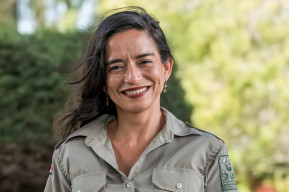It’s 3 pm on a Friday afternoon, one hour before the close of business… one hour before the weekend officially starts. A knock on the door echoes in the hallway followed by a warm invitation to come in. There she is, sitting behind her desk drowning in work, a welcoming smile on her face nonetheless. On the wall to her right are tapestries and cultural and historical souvenirs, one of which depicting the Temples of Jupiter and Bacchus in Baalbek, Lebanon. To her left are shelves bursting with books and colorful notebooks retracing her past thoughts, experiences, notes and work. A quick browse through the books reveals her name elegantly inked on some covers: Dakmara Georgescu.
Dakmara started her career in Romania as a secondary school teacher then served as Advisor to the Romanian Minister of Education before moving to Geneva to join the UNESCO International Bureau of Education (IBE) as a Programme specialist charged with coordinating technical assistance for curriculum development. She landed in Beirut in 2012 where she has been working with UNESCO’s Regional Bureau as a Programme Specialist for Curriculum, Teachers and Higher Education ever since. She is the brains behind several initiatives and activities aiming to advance curricula and teacher affairs in the Arab region. Having worked in the field for a long time, Dakmara has witnessed many turning points, including the COVID-19 outbreak that rocked the world and cast a thicker shadow on the future of education.
Two years into the pandemic, she is still working relentlessly with key international and regional partners and stakeholders to provide support for education practitioners in the region. The pandemic has hastened the transition towards remote and digital solutions, and the extended usage of Information, and Communication Technologies (ICTs) in education, prompting teachers adapt hastily to new situations. “The abrupt shift to online and remote education with no prior training or experience has been hard on teachers even in developed countries,” admits Dakmara. Teachers have had to part ways with their familiar teaching methods and make do with the scarce resources they had at their disposal to self-learn, come up with their own ICT-based solutions, methods and tools and adapt to the changing reality. “We need to see what works and what doesn’t,” she emphasizes. “It is important to collect good practices to guide teachers on what to do and where to find support.” It is also important to train teachers and teach them the ICT, metacognitive and transcending skills they are trying to pass on to their students.
This worldwide transition to distance/remote and ICT-based education has already triggered several controversial speculations on the future of education. In an attempt to keep up with all the technological developments and harness all their potential, some are pushing for an even wider use of ICTs in education. Others went as far as calling for digitizing education and removing “obsolete” traditional contents, such as memorization and basic literacy and numeracy skills, from the curriculum. This is alarming for Dakmara who explains, “memorization is an important tool for learners to accumulate, process and consolidate knowledge and information. As for skills, you must master a basic skill before you are able to learn more complex things.” Removing these components from the curriculum would pose a serious problem for learners as it would deprive them from much-needed foundational elements that help them develop complex knowledge and skills and facilitate their learning progression throughout life.
This leads Dakmara to dwell on what makes a good curriculum. “Curriculum is the foundation of education. Curriculum-related work should not only focus on what learners should learn, but also on why, when, how, and how well they should learn it.” As such, a good curriculum not only equips learners with the necessary and foundational skills and knowledge they need to go about their lives, but also teaches them how to be good people and active citizens, and how to put their acquired competencies into practice to find solutions and solve problems individually, or with others, in collaborative and constructive ways. A good curriculum keeps up with the times. More importantly, a good curriculum surpasses a sheer emphasis on the intellectual/cognitive domain and focuses on the learner as a whole, which includes the behavioral and socio-emotional aspects, as well as motor skills, and the skills needed to link theory/conceptual understanding to practice. Finally, a good curriculum motivates learners to invest time and efforts in their learning progression by privileging effective learning and enjoyable learning opportunities and experiences.
Building on this train of thought, Dakmara underlines that the future is not about getting rid of the old to make way for the new. It is about identifying what each has to offer and what works and finding a balance between them.
It’s nearly 6 pm. It’s already dark outside. Dakmara packs her things and heads home to her cat, “Habi” (short for “Habibi”[1]), her sole companion miles and miles away from her family. Lights finally go off at UNESCO Beirut Office announcing the beginning of the weekend after a long, hectic week.
[1] “Habibi” (حبيبي) is an Arabic word of endearment that means “my darling” / “my beloved”.





